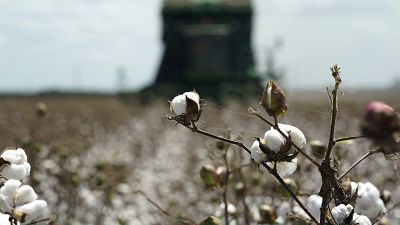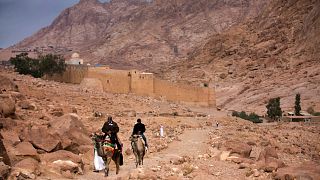Egypt
In the cotton fields of Damanhur, farmers are collecting a plentiful harvest.
Prices of cotton have almost doubled in comparison to last year, rising from about 2,000 Egyptian pounds in 2020, to between 4,000 and 4,500 Egyptian pounds per 50 kilos this year.
"The cotton season was very good this year because of the heatwave, the crop is indescribable, to be honest, the cotton crop is good this year because of the heat," says farmer Ashraf al-Shamsi.
"The cotton season this year is good God-willing, 90 percent of cotton is perfect, people were scared from last year's cotton prices as it was very weak," says cotton field owner Khalid al-Shamsi.
"People who didn't plant cotton this year are very upset, and hope they plant it next year."
But what appears to be good news for Egypt's cotton farmers could spell trouble for the North African country's food security.
Experts say changes in temperature and rainfall patterns linked to climate change - while making fertile ground for cotton cultivation - could make vital food crops, such as wheat, more difficult to grow.
Expected increases in temperatures and the change in their seasonal pattern could lead to a decrease in the agricultural productivity of some crops, as well as to changes in agro-environmental ranges.
Rises in temperature will cause winter grain production, for instance, to move further north to regions with the right temperature and conditions for the crops.
"Agriculture will be affected in terms of productivity of most of the crops because of their low resilience to temperature, rising temperatures," explains Mohammad Abdul Karim, a professor of environmental economics at Alexandria University.
"And the only crop that can sort of flourish with the increasing temperature is cotton, other than that, productivity will go down."
And Dr. Ayman Abu Hadid, a former Egyptian Minister of Agriculture now working at Ain Shams University in Cairo, says there may not be enough wheat to import should climate change stunt domestic production.
"We import approximately nine million tons of wheat and produce almost the same quantity. If the quantity produced decreases, then this is a reason to import more, and it may not be available, because climate changes that will affect us will also affect the wheat belt in Europe, America and the countries that we import wheat from in general, which depend on rain," he says.
"If rains decrease, then the productivity of wheat has changed in these countries, there may be no surplus in these countries that we can import."
According to the United Nations Development Programme, Egypt's large population of over 100 million makes the country extremely vulnerable to climate change.
Studies have indicated agriculture and coastal zones to be the areas most vulnerable.
Dr. Ayman Abu Hadid proposes rethinking where crops are grown, protecting Egypt's food security in the process.
"We need to change the agricultural map, the agricultural pattern, so that crops are planted in places where they will give the highest production and prevent their cultivation in places where production will be less," he says.
It's hoped cotton won't be Egypt's only plentiful harvest in the years to come.













01:36
CO2 emissions on track to push Earth beyond 1.5 degree threshold by 2028, report finds.
00:24
Greenland and Iceland saw record heat in May
01:30
Macron sparks global push to protect oceans
01:06
Experts warn of an increase in Glacier-related risks from climate change
01:39
Hundreds dead and missing after Nigerian town submerged by floods
01:08
Nigeria: Death toll rises to at least 200 in devastating floods